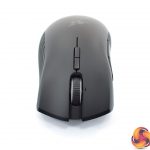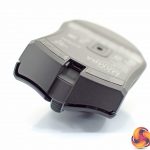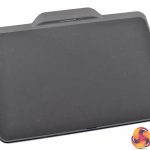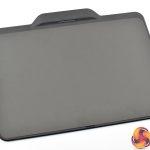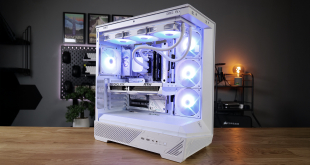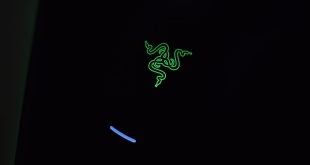
Creating a light, wireless gaming mouse has always been a challenge for one simple reason – it needs a battery. That's what we thought, at least, until Razer introduced its Mamba Hyperflux gaming mouse. It weighs just 96g and simply does not have a battery – instead, it uses magnetic induction to receive power directly, thanks to the use of a supercapacitor.
While the wording might be a bit technical, the process is very simple. The Mamba Hyperflux comes as part of a bundle with a Firefly Hyperflux mouse pad. The mouse pad plugs into your PC via USB, and the mouse then receives power from the mouse pad. There's nothing else you need to do, it just works – and it's brilliant.
- Razer HyperFlux Wireless Power Technology
- Adaptive Frequency Technology
- Mouse cable for use in wired mode without power mat
- Razer 5G optical sensor with true 16,000 DPI
- Up to 450 inches per second (IPS) / 50 G acceleration
- Nine independently programmable Hyperesponse buttons
- RazerTM Mechanical Mouse Switches
- Gaming-grade tactile scroll wheel
- Ergonomic right-handed design with enhanced rubber side grips
- Razer Chroma lighting with 16.8 million customizable color options
- 1000 Hz Ultrapolling
- Razer Synapse 3 (Beta) enabled
- Approximate size: 124.7 mm / 4.90 in (Length) X 70.1 mm / 2.75 in (Width) X 43.2 mm / 1.70 in (Height)
- Approximate weight (excluding cable): 96 g / 0.211 lbs
- Cable length: 1.8 m / 5.91 ft (For using mouse in wired mode when away from Razer HyperFlux enabled wireless power mat)
Starting with the downsides, the Mamba/Firefly Hyperflux combo is far from cheap at £249.95. Even among other premium wireless mice with charging pads – such as the Logitech G703 Powerplay, or the Corsair Dark Core SE with MM1000 mouse pad – it's still a good £70-80 more expensive. For some, that will immediately put the Mamba Hyperflux out of reach.
The second downside is, due to the lack of internal battery, you can only use the Mamba Hyperflux with the Firefly Hyperflux – it's just the only way to power the mouse. You can use the provided USB cable to use the Mamba Hyperflux as a wired peripheral – should you want to take it out and about – but the Firefly Hyperflux is a necessity for using the mouse wirelessly.
The obvious benefit to having no battery, however, is that the mouse is very light at just 96g. Comparatively, the G703 is 107g (with the 10g weight removed) while the DarkCore SE is 128g. Weight is obviously subjective, but according to our polling data the 90-110g weight bracket is the most popular among gamers, so the Mamba Hyperflux will likely have strong appeal.
Another benefit to consider is also the fact that the Mamba Hyperflux doesn't need charging – the power never runs out so long as the Firefly is connected to your PC, and the Mamba is sitting on the Firefly. The Mamba will stop receiving power once you lift it up by around an inch, and it will also take 3-5 seconds for the mouse to become responsive again once it's turned off. However, it can hold power for up to 10 seconds (according to my testing) so the mouse won't suddenly turn off as soon as you lift it from the mat.
On the topic of charging, it's also worth noting that the mouse doesn't receive power if part of it is hanging off the side of the mat. For instance, moving the Mamba to the very edge of the Firefly, with the top inch of the mouse over the edge, will cause the mouse to stop receiving power. There's a handy LED bar underneath the Razer logo which will light up if the mouse is receiving power, though, so you're not left guessing. If the LED turns off, it means no power is being received.
The last thing to note about the Firefly is that it can be used as a hard or soft surface. The Firefly has a hard plastic frame, but the inner mouse pad area itself is removable and double-sided – you can just lift it up and choose whether you want the hard or soft surface. Measuring 355 mm X 282.5 mm X 12.9 mm it is not the biggest mouse pad out there, but it did not cause me any problems and I'd wager it'll be fine for most people.
All-in-all, the Razer Mamba Hyperflux with the Firefly Hyperflux is an excellent and truly innovative product. It solves two inherent issues with wireless mice – the fact that they're heavy and need to recharge. Okay, it is far from cheap – but cutting-edge technology like this rarely is. It also helps that the Mamba itself is a top-class mouse – Hyperflux or not, the shape, sensor and buttons are quality. If you want the best wireless gaming mouse there is, we think it's the Razer Mamba and Firefly Hyperflux.
You can buy one from Overclockers UK for £249.95 HERE.
Pros
- Hyperflux technology works very well.
- Very light for a wireless mouse.
- The mouse itself is excellent.
- Chroma RGB lighting never fails to impress.
- Choice of hard or soft mouse pad surfaces.
Cons
- Expensive.
KitGuru says: With its Mamba & Firefly Hyperflux, Razer has tackled the two main issues with wireless mice head-on, and with brilliant success.
 KitGuru KitGuru.net – Tech News | Hardware News | Hardware Reviews | IOS | Mobile | Gaming | Graphics Cards
KitGuru KitGuru.net – Tech News | Hardware News | Hardware Reviews | IOS | Mobile | Gaming | Graphics Cards









